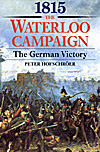 published by Greenhill Books, $45 ISBN 1-85367-368-4 hardcover
published by Greenhill Books, $45 ISBN 1-85367-368-4 hardcover
384 pages, 21 photos, 25 maps, OOBs
Having followed Herr Hofschroer's writing in First Empire, Napoleon, Age of Napoleon, and other magazines, I was quite pleased to pick up his Waterloo book. This is actually the second volume to his study of the campaign, in which he seeks to prove Blucher and the Germans--not Wellington and the British--"won" the battle of Waterloo.
Of course, this will unleash yet another storm of criticism from those who place Wellington on a very tall pedestal, just as Hofschroer's first volume did. And well it should, because history is nothing else but re-invented as new sources come to light. By delving into German documents and applying sensible extrapolation in analyzing British, German, French, and Dutch sources, Hofschroer built an argument around German fortitude in the face of British duplicity.
Essentially, Hofschroer opines Wellington lied to Blucher prior to the Battle of Ligny, and then Blucher saved the British bacon at Waterloo. What makes this fascinating is the detailed analysis of troop movements versus dispatches, and versus memoirs and other contemporary writing. The first half of the book balances the maneuvers for the four major forces under Wellington, Blucher, Napoleon, and Grouchy, showing how timing affected decisions and positions.
Hofschroer makes powerful arguments for his premise. If you've ever walked the Waterloo battlefield, his narrative brings home the strategic flank attack--and how deep it was behind French lines--that pulled French troops and Napoleon's attention away from the ridge. It's the strongest portion of the book and well worth the price of admission by itself. And unlike other recent and questionable books, Hofschroer's work is well grounded in real source materials.
The second half of the book, with the pursuit of the remnants of the French Army and the eventual fall of Paris, is less satisfactory. Don't get me wrong, it's packed with a variety of small actions and battles, and covers little-known activities. However, the prose falls away from forceful analysis, to indifferent repetition. It's as if a third book was planned and the volume had to be crammed into this book, for the author started relying on dry recitations of fact and every increasing insertions of memoirs and other primary source material instead of the well-crafted prose of earlier pages. Or maybe it was deadline pressure. Hofschroer certainly scoured sources for his work, but the presentation is drier.
Which brings us to Chapters 20 (Wellington and the Prussians) and 21 (Waterloo--A German Victory). Here, Hofschroer cranks up his passion and consolidates his premise. While I classify his numerical efforts at "percentage effectiveness" to be little more than statistical sleight-of-hand, and find some of his numbers to be over-enthusiastic, the fact remains that a heckova lot of Prussians peeled out of Wavre and descended on Napoleon's flank. And, after a battle won, they led the pursuit of the French Army back to Paris.
How this occurred and in what order represent the greatest strengths of this book. Troop commitments, strategy, dispositions, and tactics determined the victory, and there is certainly more than enough information contained within to show whether or not Wellington's or Blucher's forces should receive the lion's share of credit.
As for taking the argument one step further into "what if?" style debate, well, that's what tabletop wargaming can do with a computer simulation, board wargame, or miniatures battle. Hofschroer provides Orders of Battle in an appendix down to battalion level. However, and a nit to pick, he neglects to include unit strengths. For example, (page 350) you know that the 5th Hanoverian Brigade consisted of four Landwehr battalions (Hameln, Hildesheim, Peine, and Gifhorn). But how many soldiers were in the brigade? You have to go back to page 62 to find out it had around 2000 men, or about 500 per battalion. If would have been far better to list numerical strengths in the appendix.
Hofschroer's 1815 provides a valuable contribution to understanding the Waterloo campaign. If the prose lags in the second half, the brilliance of the first half more than makes up for it. If the author's pro-German leanings tend to overpower, it's because of compelling analysis of source materials. Simply put, if you study Waterloo, 1815 belongs in your library.
Greenhill Books
Park House
Russell Gardens
London, NW11 9NN
Tel: 0181 458 6314
Fax: 0181 905 5245
E-mail Greenhill Books
Web Site: www.greenhillbooks.com
Back to List of Book Reviews: Napoleonic
Back to Master Book Review List
Back to Master Magazine List
© Copyright 1999 by Coalition Web, Inc.
This article appears in MagWeb (Magazine Web) on the Internet World Wide Web.
Other military history articles and gaming articles are available at http://www.magweb.com